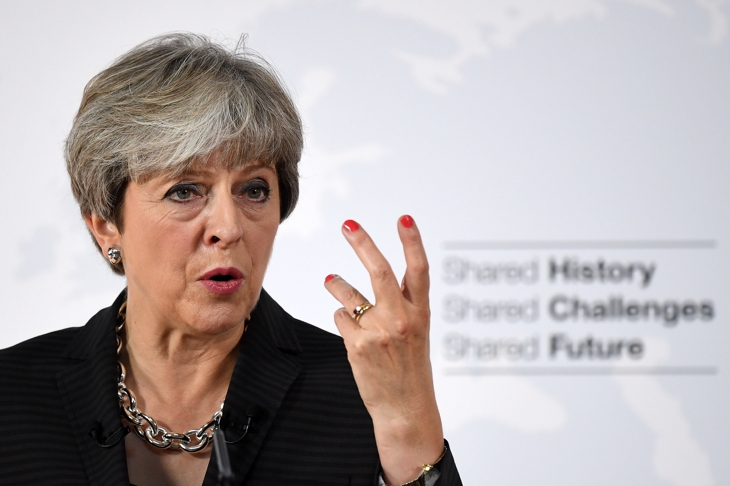Following months of tortured negotiation between the UK and the EU, Theresa May delivered her speech in Florence yesterday in an attempt to break the Brexit deadlock. Mrs May proposed a two-year transition period during which Britain would retain its access to the single market and confirmed that the UK Government will honour its commitments to the EU budget. She also spoke of the ‘shared challenges and opportunities’ that face the UK and the EU in a bid to build consensus.
Here’s how Europe’s press reacted to the long-awaited speech.
France
France’s centre-left daily, Le Monde, agrees with Theresa May that Brexit negotiations can be extended beyond March 2019, however, points out that all member states must be in favour of such a move. Ridiculing her ‘long and vain developments on the Italian Renaissance’, the paper identifies a change in Theresa May’s tone since her Lancaster House speech and laments the fact that it has taken ‘eight months to take a few steps’.

Le Figaro picks up on Theresa May’s new, sympathetic approach to Brexit negotiations, observing the way in which she ‘unveiled her broadest smile’ when she discussed the shared history between the UK and the EU. Despite this new charm offensive, Le Figaro reminds its readers that, after three ‘stormy sessions in Brussels’, talks between the UK and the EU are currently at a standstill.

The Paris-based daily, L’Opinion, carries news of Moody’s decision to downgrade the UK’s credit rating and derides the fact that, fifteen months after the referendum and six months after triggering Article 50, Britain is ‘still unable to give precise answers to the questions posed by its forthcoming departure’. One a slightly more positive note, the paper welcomes the dawning realisation that Britain will not be able to retain all the benefits of EU membership after Brexit.
Libération describes Theresa May as a ‘very fragile’ prime minister who is ‘playing for her immediate future’ after losing her majority in the general election and then having her authority challenged by Boris Johnson. Her challenge, according to the paper, was to convince the British public as well as the Conservative Party that she is in control of Brexit.
Germany
Economists and lobbyists may finally feel that their requests have been heard in Number 10, says the Frankfurter Allgemeine Zeitung, as Theresa May cleared the way for a two-year transition period after Brexit. However, amid reports that the UK Government will be willing to pay a €20 billion divorce bill, the paper reveals that officials in Brussels expect between €60 billion and €100 billion to be paid by the UK.

Remarking upon the fine line that Theresa May finds herself treading, Frankfurter Allgemeine Zeitung notes that she simultaneously attempted to break the deadlock in Brussels and remain sufficiently vague in order to ensure that war does not break out within the Conservative Party.
Germany’s centre-left Süddeutsche Zeitung also picks up on Theresa May’s change in tack since her Lancaster House speech and suggests that she has been forced to ‘eat her own words’. The newspaper’s foreign policy chief, Stefan Kornelius, argues that Theresa May finds herself in a ‘pitiful position’ and likens her to a beetle: ‘she lies on her back and struggles desperately – but she will not be able to do it on her own’. However, Kornelius welcomes Theresa May’s ‘surprisingly courageous offer’ on a two-year transition period, something which he views as a sign that the moderates within the UK Government are gradually winning the Brexit war. He also interprets the promise of financial contributions during a transition period as a ‘signal of goodwill’.

However, Theresa May’s new approach is being viewed as a climb down. Kornelius encapsulates her position as follows: ‘I have decided to expose myself and make myself vulnerable, now you must help me’.
Meanwhile, the high-profile ally of Angela Merkel, Manfred Weber, took to Twitter to state that he is ‘even more concerned’ following Theresa May’s speech, which failed to offer greater clarity on the UK Government’s position.
In substance PM May is bringing no more clarity to London's positions. I am even more concerned now. #florencespeech
— Manfred Weber (@ManfredWeber) September 22, 2017
The clock is ticking and time is running faster than the government believes in London. #florencespeech #Brexit @EPPGroup
— Manfred Weber (@ManfredWeber) September 22, 2017
Switzerland
Switzerland’s Neue Zürcher Zeitung says Theresa May’s claim that ‘no deal is better than a bad deal’ no longer carries weight. According to the newspaper, Theresa May failed to ‘emphasise the commonalities of all Europeans’ and suggests that the speech, which was lacking in substance, may not break the deadlock in Brexit negotiations.






Comments